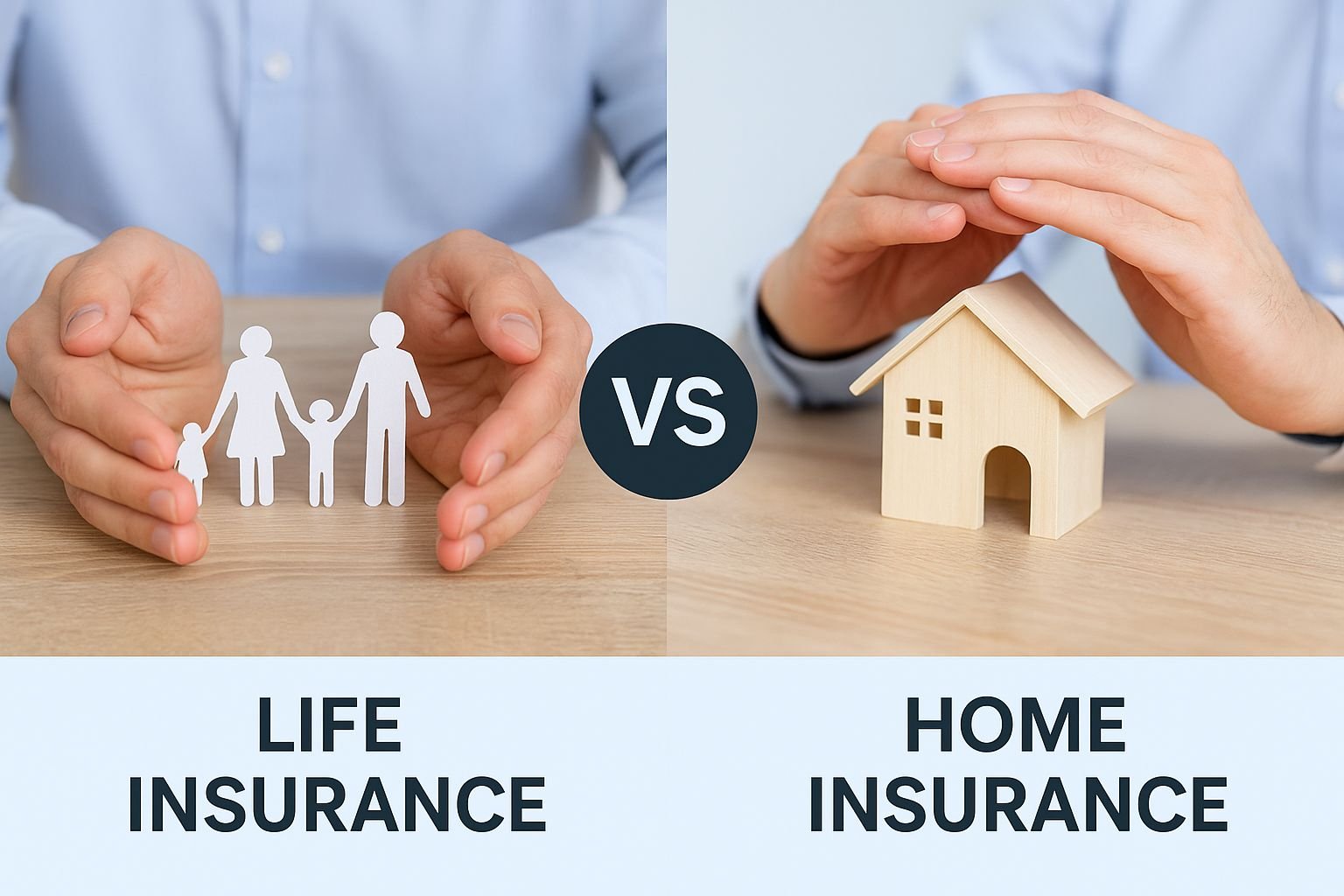When planning for financial security, life insurance and home insurance often emerge as critical considerations. Both serve distinct purposes, offering peace of mind and protection against unforeseen events. But how do they differ, and which one is right for you? In this blog, we’ll break down the key differences, benefits, and considerations of life insurance and home insurance to help you make an informed decision.
What is Life Insurance?
Life insurance is a financial product designed to provide a death benefit to your loved ones or beneficiaries in the event of your passing. It acts as a safety net, ensuring that your family can maintain their lifestyle, pay off debts, or cover expenses like education or mortgages.
Key Features of Life Insurance
- Financial Security: Provides a lump-sum payout to beneficiaries, helping them cover living expenses, debts, or future goals.
- Types of Policies: Options include term life insurance (coverage for a specific period) and whole life insurance (lifelong coverage with a savings component).
- Premiums: Payments are made monthly or annually, with costs varying based on age, health, and coverage amount.
- Flexibility: Some policies offer cash value accumulation, which can be borrowed against or withdrawn.
Life insurance is ideal for anyone who wants to ensure their family’s financial stability after they’re gone, especially if they have dependents or significant financial obligations.
What is Home Insurance?
Home insurance, also known as homeowners insurance, protects your property and belongings from risks like natural disasters, theft, or accidents. It’s a safeguard for one of your most valuable assets your home and provides liability coverage for injuries or damages that occur on your property.
Key Features of Home Insurance
- Property Protection: Covers damages to your home’s structure caused by events like fire, storms, or vandalism.
- Personal Belongings: Reimburses you for lost or damaged items, such as furniture, electronics, or jewelry.
- Liability Coverage: Protects you if someone is injured on your property or if you accidentally damage someone else’s property.
- Additional Living Expenses: Covers temporary housing costs if your home becomes uninhabitable due to a covered event.
Home insurance is essential for homeowners or renters who want to protect their property and avoid significant financial losses from unexpected events.
Comparing Life Insurance and Home Insurance
While both types of insurance aim to provide financial protection, they serve different purposes. Here’s a detailed comparison to highlight their differences:
| Aspect | Life Insurance | Home Insurance |
|---|---|---|
| Purpose | Ensures financial support for dependents after your death | Protects your home, belongings, and liability risks |
| Coverage | Pays a death benefit to beneficiaries | Covers property damage, theft, and liability claims |
| Beneficiary | Family members or designated beneficiaries | Homeowner or renter |
| Policy Duration | Term (fixed period) or whole life (lifelong) | Typically renewed annually |
| Cost Factors | Age, health, lifestyle, and coverage amount | Home value, location, and risk factors |
| Payout Trigger | Death of the policyholder | Damage, theft, or liability incidents |
| Optional Add-ons | Riders like critical illness or disability | Flood, earthquake, or extended liability coverage |
Benefits of Life Insurance
- Peace of Mind: Knowing your family will be financially secure if you’re no longer there to provide for them.
- Debt Coverage: Helps pay off mortgages, loans, or credit card debts, preventing financial strain.
- Legacy Planning: Supports long-term goals like funding education or leaving an inheritance.
- Tax Benefits: In many cases, life insurance payouts are tax-free for beneficiaries.
Benefits of Home Insurance
- Asset Protection: Safeguards your home and belongings from costly damages or losses.
- Liability Coverage: Protects you from legal and financial responsibility if someone is injured on your property.
- Rebuilding Support: Covers repair or rebuilding costs after events like fires or storms.
- Temporary Housing: Ensures you have a place to stay if your home is uninhabitable.
Which One Should You Choose?
Choosing between life insurance and home insurance depends on your personal circumstances and priorities. Here are some scenarios to guide your decision:
Choose Life Insurance If:
- You have dependents who rely on your income.
- You want to cover outstanding debts or future expenses like education.
- You’re planning for long-term financial security or legacy goals.
Choose Home Insurance If:
- You own or rent a home and want to protect your property and belongings.
- You live in an area prone to natural disasters or theft.
- You want liability protection for accidents on your property.
In many cases, you may need both types of insurance to ensure comprehensive protection. For example, a homeowner with a family might opt for term life insurance to cover their dependents and homeowners insurance to protect their property.
Tips for Choosing the Right Insurance
- Assess Your Needs: Evaluate your financial obligations, dependents, and property value to determine the coverage you need.
- Compare Quotes: Shop around for insurance quotes to find competitive rates and coverage options.
- Understand Policy Terms: Read the fine print to know what’s covered and any exclusions.
- Work with a Trusted Provider: Choose reputable insurance companies with strong customer service and claims processes.
- Review Annually: Reassess your policies regularly to ensure they align with your current needs.
Conclusion
Both life insurance and home insurance play vital roles in securing your financial future, but they address different risks. Life insurance ensures your loved ones are cared for after you’re gone, while home insurance protects your property and belongings from unexpected events. By understanding their differences and assessing your needs, you can choose the right coverage or a combination of both to achieve financial peace of mind.
Take the time to explore your options, compare policies, and invest in the protection that best suits your lifestyle. After all, safeguarding your future and your home is a step toward a worry-free life.

